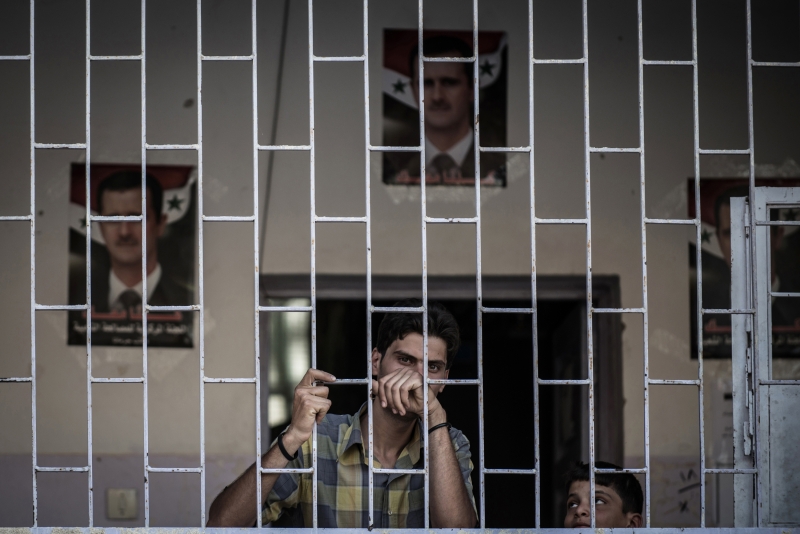 / Are Syrian Refugees Really Refugees?
Subscribe
/ Are Syrian Refugees Really Refugees?
Subscribe

The Syrian War has unleashed a humanitarian catastrophe. Since 2011, hundreds of thousands of Syrians have been killed or injured, and millions have lost their livelihoods and homes, due to a set of brutal, intractable power struggles between a bewildering tangle of groups. (This video provides some brief background on the complex causes of the conflict.) Alongside chaos inside Syria itself, the war has resulted in an estimated 5 million refugees fleeing the country in search of sanctuary throughout the Middle East and Europe.
I typed the word “refugees” just now. But I paused while doing it, because it’s not clear that it’s the right term to use for those escaping the Syrian War. Hello? I hear you reply here. Where have you been for the past six years? Did you somehow miss all those pictures of Syrians crossing hazardous oceans, spilling onto beaches, and crowded into camps? If these people aren’t refugees, who on earth is?
Here’s the cause of the pause. According to the definition of “refugee” used in international law, only those fleeing persecution count. The United Nations 1951 Convention Relating to the Status of Refugees requires a refugee to prove that she or he has a well-founded fear of being singled out for attack on grounds of race, religion, nationality, membership in a particular social group, or political opinion. Many of those fleeing Syria can’t do this, because what they are fleeing is the general chaos of war, not individual persecution. The 2016 bombings of Aleppo, for instance, were indiscriminate: they didn’t aim to harm any particular Aleppans.
This may seem like the kind of quibbling over definitions that only a lawyer—or a philosophy professor—would engage in. But who we count as a legal refugee has significant real world consequences. Last year, Germany reduced the status that it gives to many Syrians from “full asylum” to “subsidiary protection” for the reason I’ve just laid out. Those who gain subsidiary protection only get a one-year initial permit, must wait two years to apply to bring their families over and face more stringent conditions when applying for permanent residency.
Morally, many of us operate with a broader definition of “refugee” than the legal one. The German government did, after all, start by granting full asylum to many non-persecuted Syrians. Presumably their thought was that fleeing from war is enough to ground a claim to sanctuary, whether or not the person fleeing has been personally targeted. There’s something very appealing about this thought. But notice what seems to follow from it. Once we relax the requirement of individual persecution, it becomes hard to know where to stop. If fleeing from war makes you a refugee, shouldn’t fleeing from natural disasters or desperate poverty also make you one? All three of those conditions—war, disaster and poverty—involve a failure to secure basic rights to physical safety, health, food and shelter. If Germany had stuck with its broader definition of “refugee,” instead of retreating to the narrower Convention definition, it might have found itself required—on pain of moral inconsistency—to accept asylum applications from half the global population.
One response to this point is to claim that that’s precisely what Germany ought to do (or, at least, that wealthy countries as a group ought to.) Surely what’s morally crucial is whether or not a person’s basic rights are secured. So why should we prioritize particular reasons for being in urgent need—persecution or war—rather than simply focusing on the severity of the need? By analogy: if someone enters a hospital emergency room with a broken leg, the doctors don’t normally ask, before deciding whether to provide treatment: “Okay, so did you break this leg while running away from a hate crime? Or while running away from a tsunami? Or while running away from your landlord because you haven’t paid rent in six months?” None of that is relevant to what the doctors ought to do. They just go ahead and treat the leg.
The idea that the world’s wealthier countries have an urgent moral obligation, of some sort, to assist victims of war, poverty and natural disaster worldwide is one that I don’t think a decent, reflective person can deny. (Though many people have, of course, denied it). Notice, though, that there are different ways that we might fulfill this obligation. For instance, we might engage in international peacekeeping efforts, lobby for fairer international trading rules or promote development projects and provide emergency aid within poorer countries. The suggestion I’ve been considering—that we should treat the global poor and war and disaster victims as refugees—amounts to the claim that we should fulfill our obligation to them in one quite specific way: by granting them residence in our country. An argument needs to be made why this particular way of fulfilling our obligation is necessary.
Those who defend the narrower, Convention definition of “refugee” often appeal to this point. They argue that the only way to reliably secure the basic rights of victims of individual persecution is to remove them from the site of their persecution. This fact, they suggest, is what grounds the specific right to asylum. General victims of war, poverty and natural disaster can, on the other hand, be assisted on site, and this will often make better sense, both practically and morally.
Are matters really this simple, though? To focus on the poverty case, it’s not as if international efforts to secure people’s rights to subsistence, health and shelter have succeeded spectacularly so far. In theory, we might be able to promote poverty relief via efforts abroad. But given that, in practice, we haven’t achieved that goal yet, is it permissible for us to deny asylum to the many poor people who are desperate to enter our own country? The idea that victims of individual persecution are the only people who can only be helped via asylum starts to look suspect. Moreover, the claim that victims of individual persecution can only be helped via asylum turns out to be suspect, too. Some of the persecuted might best be assisted by other forms of international action (such as diplomatic pressure, sanctions or, at the extreme, military intervention).
Defenders of the Convention definition sometimes take a more pragmatic tack here. Even though we should accept that many persons other than the persecuted have a moral claim to asylum, they argue, there remains good reason to keep the legal definition of “refugee” narrower. Wealthy states are already reluctant to admit desperately needy foreigners. We’re more likely to persuade them to fulfill their moral obligations if we restrict their duties under international law to a smaller set of cases.
Deciding who counts as a refugee may seem like a rather abstract question at the current political moment. The Trump administration appears unconvinced that even those who unambiguously count as refugees under the Convention definition are owed our assistance. The prospect of the United States expanding its concept of refugees to include further groups of the disadvantaged is about as likely as….well, let’s just say I’m not betting my life savings on it. Is discussing this question pointless, then?
The women, men and children currently fleeing Syria, along with the world’s 60 million other forcibly displaced people, are among the most vulnerable people on earth. They deserve our urgent assistance, as a matter of both basic humanitarianism and justice. That assistance won’t be provided if we can’t persuade ourselves and others to give it. Such persuasion depends on providing compelling reasons in favor of the different available policy options and responding carefully to objections to those reasons—the kind of thing that students and professors aim to do every week in the classroom, and the kind of thing that, ideally, we do as engaged democratic citizens in the public sphere. The current political environment may be inhospitable to that practice. Now is not the time to give up on it. On the contrary, it’s the time to double down on it: for the sake of ourselves, for the sake of our fellow citizens, and for the sake of our fellow humans—from Syria and elsewhere.
Helena de Bres is associate professor of philosophy at Wellesley College. She researches global distributive justice and teaches political theory, ethics and philosophy of literature.
Photo Credit: Chaoyue, “Syrian Refugee,” via Flickr, 31 May 2014.








